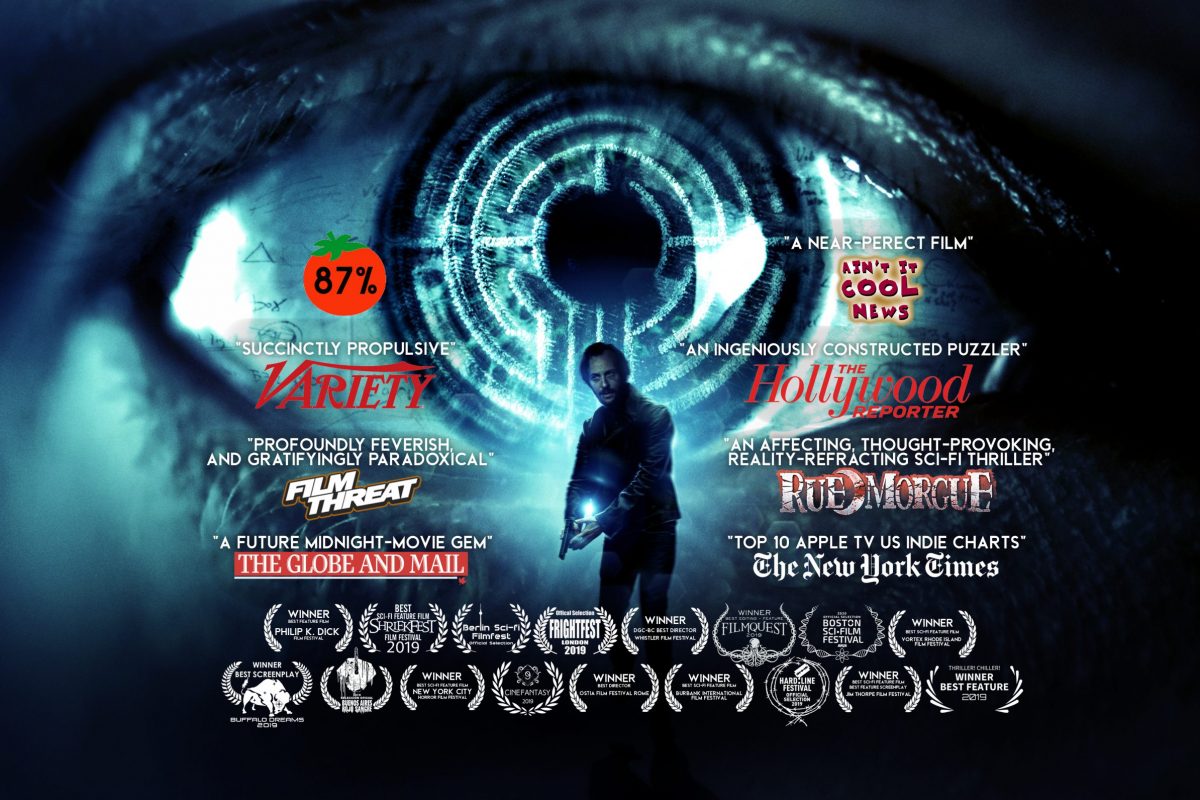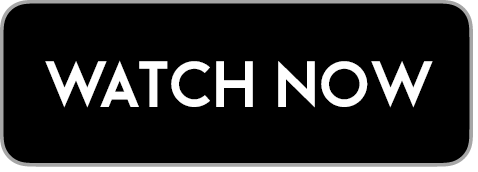
AIN’T IT COOL NEWS — “A NEAR-PERFECT FILM”
VOLITION Available Now on All Streaming Platforms!
Published at: July 11, 2020, 11 p.m. CST by McEric
I know, times are tough. We thought the world would open, then they closed it again. It’s especially bleak here in Texas. And apparently there’s a heat wave, too, but I genuinely haven’t been perturbed by it and I think that’s because I’m resigned to believe that I’m already in Hell.
Fantastic Fest is cancelled. Christopher Nolan’s TENET got pushed back. They’re talking about rebooting “Baywatch!” Is there any hope in sight?
After discovering I had contracted COVID-19 last month, I quarantined myself in my apartment. I slept a lot, drank a lot of whiskey, and lost twelve pounds. I also emailed every PR contact and scooped up all the screeners I could shove into my eyes. One of the true diamonds in this rough patch was the film VOLITION, by Tony Dean Smith, co-written and produced with his brother Ryan W. Smith. Check out the trailer:
VOLITION is a near-perfect film. The performances, cinematography, special effects, and color palette are all exceptional. What truly sets it apart, though, is the script. This is one of the more brilliant films I’ve seen on the indie sci-fi circuit, which sadly sometimes just goes for the mindfuck without much foreplay. Not so with the Smiths, who took their time to craft a tight story with emotion, intelligence, and a fair amount of philosophy. It left me with a few questions, but mostly a deep appreciation for the work that went into this wonderfully memorable tale.
I got the opportunity to chat with director Tony Dean Smith and his producing and writing partner, and brother, Ryan W. Smith on the last day of my quarantine. We talked about the story behind the film, assembling the great cast, and locking a sibling into a lifelong contract at age seven.
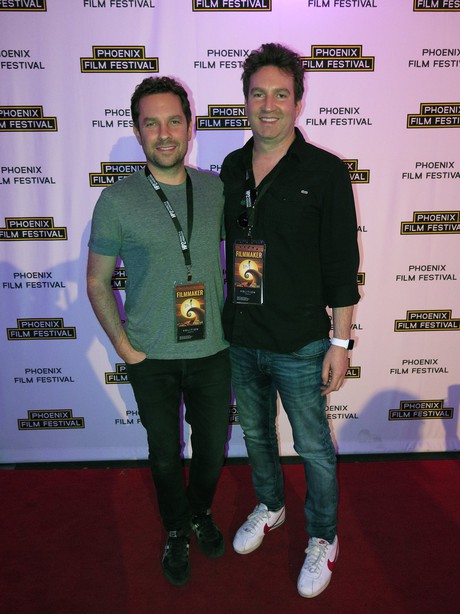
Eric McClanahan: Good morning, gentlemen. How are ya?
Tony Dean Smith: Good morning, Eric. We’re good. How are you?
EM: I’m well, thank you.
TDS: You’re one of the legends in my world. I hope you don’t mind me saying that.
EM: Me?
TDS: Yeah, you. You’re McEric and Ain’t It Cool! I’ve loved you guys forever.
EM: Well, thank you very much. I really appreciate that. I think that’s the first time I’ve heard that; sorry I was so taken aback. Well I’m really excited to talk to you guys because VOLITION is an amazing feat. It’s a very good film. Tell me about putting this film together, starting from the writing process.
TDS: Sure. The original kernel of an idea came to me a very, very long time ago in film school. As a teenager I was always late to everything, and when I got to film school they said “write what you know” so I thought, okay, I’m going to write about a scientist that invents a drug that makes him early, but he’s perceptionally early: he sees snippets of the future in fixed increments. So that was kind of the original rule of what I had stumbled upon – instead of a psychic who can see everything in everyone’s world, he can only see his own. But it was never grounded; it was this short film that I wrote didn’t have the depth of a theme that VOLITION would later have. A few years later I was feeling a little bit stuck in my film career, sort of feeling that I would never get the thing that I wanted to get, and I realized that my perception was actually a bit of a prison. What if my perception, what I was seeing in the future, was actually causing my future? I was this whole esoteric breakdown and I realized, oh, maybe that’s the missing piece to that script that I had. So I put those together and I wrote the script from James’s perspective rather than the scientist’s and the script was… good, cool, but it wasn’t until Ryan came on board, about a year later, that we dismantled it and instead of telling the story chronologically, we took another route. We used the clairvoyance in our film which was really exciting. And that’s the origins of the film.
EM: The only way that clairvoyance could work onscreen is that it has to be sold by the James character; he has to believe in it. Was Adrian Glynn McMorran involved in the writing process at all? Tell me about bringing him on board and getting him sold on this idea.
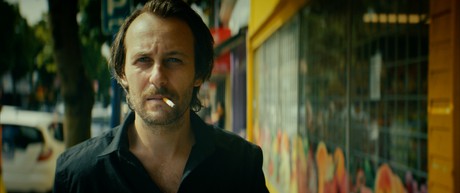
TDS: Adrian Glynn McMorran is someone that I had worked with before, as had Ryan, and we’ve known him since high school. He’s an incredible musician and very authentic artist, so when we were writing the character we knew in the back of our mind it could very likely be Adrian. He was not involved in the writing, itself, but we knew him so we could sort of try him on, and then eventually we did table reads down the road and everyone was able to mold the characters more to their own image. But we pretty much felt James as you see on the screen, and so it was in the script. Casting Adrian was really easy; he brought so much of his own world and his own history to it that what you see is actually a blend between Adrian and James, and that’s what we wanted.
EM: Tell me about young James’s artwork. Who made that for you guys? [In the film, James has experienced his clairvoyance from a very young age and has a collection of drawings he made of his visions.]
Ryan W Smith: The making of VOLITION was a bit of a family affair. We produced it ourselves, with the help of Paly Productions. Our sister was actually our first A.D. and our other sister actually ended up doing catering for our set. As for that artwork, our sister is involved in the community as a teacher, part time, and she actually asked her students to create all that artwork for young James. So those are authentic kid drawings.
EM: Nice outsourcing!
TDS: Hopefully they’re not too traumatized.
EM: Exactly. ‘Cause some of those pictures were kind of disturbing. Tell me about some of the background that you drew from in terms of time perception; some films or books that influenced the script.
TDS: It’s a long road of studying up in this area. Number one, we all love movies like 12 MONKEYS and BACK TO THE FUTURE, and as for the writing, itself, we love philosophy and articles of pseudo-science and whatnot. This came about along those lines, where as we were developing the story we realized that our own life experiences can be brought into it. Speaking for myself, that is, because I’ve had some really weird experiences that I would love to say are purely coincidental, but all of it can’t be explained away. So while writing the story we infused some of our experiences into it along with books by Philip K. Dick that we were reading, after the fact of finishing the first draft. We found a whole set universe of material to explore for this concept, which was very exciting for us.
RWS: When Tony first approached me with the early draft, what really grabbed me was the kernel of this idea of science fiction. A unique look at clairvoyance and what could be the cause behind it. I hadn’t seen that anywhere before and that’s what inspired me to want to hop onboard.
EM: When did you wrap filming on VOLITION?
TDS: We wrapped filming in mid-2018, and then started our festival run in March of the following year.
EM: What is it like now as brothers, producers, writing partners, and filmmakers during this pandemic? What are you guys doing now?
RWS: As brothers, I don’t know. We’re continuing to brainstorm ideas and collaborate. It’s been an interesting time in that it feels like a science fiction reality. Definitely inspiring some collaborations. And in terms of our future collaborations we’ve definitely been moved by everything that’s going on in the world right now and we’ve been thinking about the social context right now and how to explore that through the prism of sci-fi.
EM: Yeah, I definitely think we’re going to see a lot of explorations on what we’re going through right now in the near future of film. So this film is releasing July 10th [I know; I’m late]. How does it feel to be releasing the film in a time like this? This unprecedented moment in history?
TDS: Well, it’s a really strange time, of course, for everybody. Theaters are closed, and Christopher Nolan’s movie is pushed. It’s really strange and unsettling for everybody. And for us; I mean, it’s our first movie. But it’s still exciting, and we’re so thrilled that it’s getting out there and the world is going to hopefully connect to it. We had a small theatrical run scheduled, but we won’t get to it. It’s so much more important for the world now to get better. We’re just happy that it’s getting out there and we get to engage with our fans and see what people think about it.
EM: Just before you called I was watching an interview you two had done where you showed some of the early films you’d made, back when you were twelve and seven, respectively. For those who haven’t seen it, tell me about that contract that Tony had Ryan sign.
RWS: I’m still under contract, so I’ll let Tony speak.
TDS: Yeah, the statute of limitations is still in effect. Basically, Ryan was a bit of a renegade 7-year-old. As the professional 12-year-old director that I was it was very hard to discipline a 7-year-old. We were shooting multiple scenes all the time and eventually I had to coerce Ryan into signing a contract, believe it or not, which is written on Knott’s Berry Farm dinosaur paper stipulating that he had to come shoot the scene whenever I wanted to and he can’t wimp out and go crying to his mom; our mom, I should say. And he signed it, so it’s all fair and square.
RWS: It’s so hilarious. So many days, I mean, that’s how we spent our time: making films. The signature that you see on that dino paper is still the one I use today, by the way.
EM: So tell me about assembling this cast. Magda Apanowicz was wonderful, as well as Bill Marchant, and bringing in the Cassinis. Quite a few Canadians. Tell me about getting this cast.
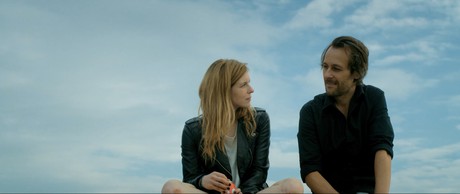
TDS: Sure. Again, Ryan and I had worked with Adrian before and so we knew we wanted him. Magda is someone I had directed in film school, actually. I was a guest director and she was a student and she was just incredible so I knew that Ryan and I had to see her. And John Cassini, I had directed John a long time ago on a TV show and we just really hit it off. And Ryan and I did a short film that Frank Cassini was in. We were just really lucky to have worked in Vancouver, Canada and this incredible pool of talent up here. Getting Bill Marchant, as well. I’d known Bill for a long time; I actually edited a feature film for him when I was editing. And Aleks Paunovic; we wanted him from the get-go. You know, WAR FOR THE PLANET OF THE APES, SNOWPIERCER, and a bunch of other cool projects. It became a real family affair. They all loved the script and liked us and what we were trying to do. So it was actually pretty easy, the casting process, for us.
EM: Yeah, Aleks Paunovic always brings such a Gravitas to the screen. As soon as I saw him I said “Oh, that guy! He’s great!”
RWS: When Aleks arrived on set, he’s such a big personality and a big guy that I was actually nervous. But he’s the warmest actor and warmest person in the world, and so great to work with.
EM: So what are you hoping that viewers will take away from VOLITION?
RWS: Well I just want to say that we know that everyone is healing from the wounds of having to wait longer for TENET to arrive, and my hope is that our film can be a tiny sliver of hope in that heady, time-bending genre that can hopefully keep us interested and engaged while we wait for TENET. Tony and I, I know, can’t wait to see that.
TDS: Absolutely.
From here we get into spoilers, and I don’t want to take anything away from your initial viewing of this superb science fiction film. I had a great time picking Tony and Ryan’s brains about some of the more intricate details behind the film’s unraveling, and I guess that’s for me to have to myself. I don’t get paid for this so I have to take some rewards wherever I can. A great big thank you to Tony Dean Smith and Ryan W. Smith and I wish them all the luck in the world with VOLITION and whatever else they’ve cooked up in quarantine. (And I linked that interview I referred to earlier so you can see their early films; they’re a delight.)
Stream VOLITION today on all the major digital fronts and let me know what you think about their contribution to the science fiction/thriller lexicon. Is it the perfect aperitif for Nolan’s TENET? Let us know.
Until next time, stay safe and stay sane.
-McEric, aka Eric McClanahan-

